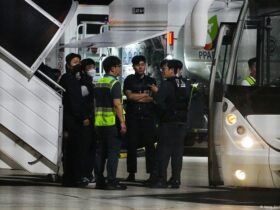During a visit to Chattogram Port in May, Bangladesh’s interim leader Muhammad Yunus announced plans to hand over the operation of the New Mooring Container Terminal (NCT) to foreign companies. Despite being the “heart of Bangladesh’s economy”, the port has been neglected for a long time, he said.
Yunus serves as the “Chief Adviser” – the head of the Bangladeshi administration appointed after veteran leader Sheikh Hasina was ousted in an August 2024 mass uprising. The interim government has promised to focus on reforming institutions, ensuring justice for past abuses, and holding free and fair elections, which it will replace with a democratically elected cabinet. Elections are scheduled to be held in February next year.
The temporary administration has also tried to attract new investment and signal economic stability. However, the decision to hand over a major port to foreign operators took many by surprise.
Foreign partners still unknown
Located on the Bay of Bengal, the Port of Chattogram – formerly known as Chittagong – handles more than 90% of Bangladesh’s maritime trade and almost all of its container traffic.
Due to the ongoing political turmoil in Bangladesh and media attention being focused on the upcoming national elections, the port issue has disappeared from public attention. However, on 12 October, Shipping Secretary Mohammad Yusuf announced that two more terminals – Laldiya, also in Chattogram, and the river port of Pangaon in Dhaka – would also be leased to foreign companies for 25 to 30 years.
He confirmed that the transfer would be completed by December. He did not say which companies and which foreign countries would be involved in this project.
Retired General ANM Muniruzzaman, a security analyst and president of the Bangladesh Institute of Peace and Security Studies, criticized the move.
“An unelected, interim government nearing the end of its term should not take decisions with long-term national consequences,” he said.
Chattogram is benefiting from business
Shipping Secretary Mohammad Yusuf defended the lease decision at a recent seminar in Dhaka, saying Bangladesh’s ports suffer from inefficiencies that make them less competitive.
“We are doing something that doesn’t exist anywhere else in the world – opening containers inside the port and releasing goods,” he said.
The interim government also claims that foreign management has worked in India, Sri Lanka and Myanmar and doing so will benefit Bangladesh.
However, there are some points which seem to contradict the government’s statement. For one, Chattogram Port was profitable in the 2024–25 financial year, and recorded net earnings of €242.75 million ($284 million). Critics also argue that the new mooring terminal already meets international standards, operates at full capacity, and does not have room for expansion – making further investment inappropriate.
Rumors have it that DP World is eyeing the Chattogram lease
There are also rumors that the interim government is planning to lease out the NCT to the UAE state-owned company DP World.
If this proves true, the company’s track record could become another headache for Bangladesh, which is already trying hard to balance the interests of regional rivals India and China.
In 2006, despite the close alliance between the US and the UAE, DP World was forced to exit management of six US ports following bipartisan backlash over national security concerns.
In 2018, Djibouti unilaterally terminated DP World’s 50-year port concession, citing “sovereignty concerns”. The government later partnered with a Chinese firm to run a competing terminal, sparking legal and geopolitical controversy over contract enforcement and foreign influence.
DP World’s port operations have also faced scrutiny in Senegal, Angola and Peru over political interference and transparency issues.
“This unit works closely with the US, particularly the US Navy,” said security analyst Muniruzzaman. “They have worked jointly in different countries.”
Bangladesh Army affected by lease schemes
Chattogram Port connects South Asia to global sea routes and serves as a major transit hub for the northeastern states of India, making it important for regional trade. China also sees the port as a strategic link in its Maritime Silk Road, which aims to expand both commercial influence and naval presence in the Bay of Bengal.
The presence of major Bangladeshi naval bases near Chattogram port adds another layer of complexity. The NCT itself is currently operated by the Navy, making the Army a key stakeholder in the decision.
“As a dual-use port, it serves both commercial and military purposes, making security concerns particularly relevant,” Muniruzzaman told DW.
“Such a major decision related to national security should not be taken with utmost caution and without a clear political order,” he said.
Bangladesh Army Chief General Wakar-uz-Zaman has also expressed concern about the planned transfer of NCT. According to local media reports, while addressing army officers in May, he had stressed that in addition to the political leadership, local communities should also be involved in such decisions and it should be taken by a politically elected government.
Lease plans made behind closed doors
In an interview with DW, Bangladeshi economist and rights activist Anu Muhammad Accused the government of bypassing transparent processes.
“Ignoring all advice, the government is moving towards leasing the port to a foreign company without any consultation or competitive bidding,” he said.
Many critics say that the interim government was willing to engage in months-long negotiations with political parties to build consensus on political and institutional reforms. In contrast, the lease plan was never discussed with any party leader.
“We don’t understand why the interim government is making such an agreement without informing anyone,” Rumin Farhana, a Bangladesh Nationalist Party (BNP) leader who focuses on international affairs, told DW.
Farhana argued that the authority of the interim government is limited to routine administrative functions and does not extend to making long-term agreements such as leasing strategic ports.
“This involves complex issues like geopolitics and national security. Therefore, the government cannot take such steps without transparency and public consultation,” he said.
Turning the Bay of Bengal into a battlefield
Ruhin Hossain Prince, general secretary of the Communist Party of Bangladesh (CPB), claims that the port deal “reflects the influence of the hidden power structure within the government to serve vested interests.”
Meanwhile, retired General Muniruzzaman warned that the decision could create a domino effect, turning the Bay of Bengal into a battleground for competing global and regional powers. “If one state’s influence grows, others may step back to protect their strategic interests,” he said.
The press wing of the Chief Adviser’s office declined to respond when contacted by DW for comment on the lease plan controversy.
Edited by: Darko Janjevic






Leave a Reply